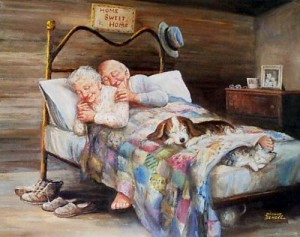Today I spent a frustrating hour seated on a stool in front of a Walgreen’s photo kiosk trying to order prints. I had two cameras, two different sized “cards” and only minimal understanding of how to work the machine. One of the cards needed an adaptor, plus I had two different coupons.
After interrupting the cashier for help six times, I got to the end of my order and muffed the coupon screen. This time she said, “I think I’ll get the manager, even though he’s on his dinner break.”
I’d probably be the laughable subject in the break room later on, but I didn’t care, as long as I walked out of there with my pictures.
The manager was a tall, 30-something “kid” with a winning way. While working on my “case” he punched enough computer buttons to write a letter, but eventually we got it sorted, and I got my 25 free prints. We were half way through the money transaction for the rest when he noticed my name on the order. “Nyman, eh? We might be related.”
“How so?” I said.
“I’m relatives with lots of Nymans from this area.”
We chatted for a few precious minutes of his dinner break when unexpectedly he said, “My dad died recently.”
I was surprised but put my purse and pictures on the counter and said, “When?”
“Three days before Christmas,” he said, looking down.
“Oh my. That’s really recent.”
“Yeah.”
“What did he die of?”
“Pancreatic cancer.”
Suddenly we were related. I learned his dad had had only eight weeks and that a cherished uncle had also died just a few days before his father. As he talked, his face was pinched with grief, and my heart grew heavy for him.
When the conversation finished, I said, “I’m so sorry about your dad and your uncle.”
He bowed his head and muttered, “Thanks.”
Driving home I felt queasy. While growing up, I hadn’t heard much about disease and dying. Now it’s everywhere, which must be part and parcel of being 60-something. Yet this young man was only in his 30’s. My kids were young, too, three in their 30’s, three in their 20’s, one still a teen. Although friends prayed for their dad to be healed, Nate died.
God has been called the great physician, the miraculous healer. I’ve learned, though, that he usually sidesteps physical ailments to focus on healing hearts. Dr. Luke describes a moment when the Jewish leaders were criticizing Jesus for associating with sinners and eating with “the riff-raff.”
Jesus gave them a sharp response: “Those who are well have no need of a physician, but those who are sick. I have not come to call the righteous but sinners to repentance.” (5:31-32) His desire was to heal sin-sickness, because when that gets healed, eternal good health becomes a sure thing.
Today at the Walgreens counter, I wish I’d asked the young manager if I could pray for him then and there. People usually receive that gladly, and maybe it would have led to something significant.
Maybe I’ll take a few more pictures and head back to the kiosk with coupons that I’m not quite sure how to use.
“By his wounds you have been healed.” (1 Peter 2:24)





